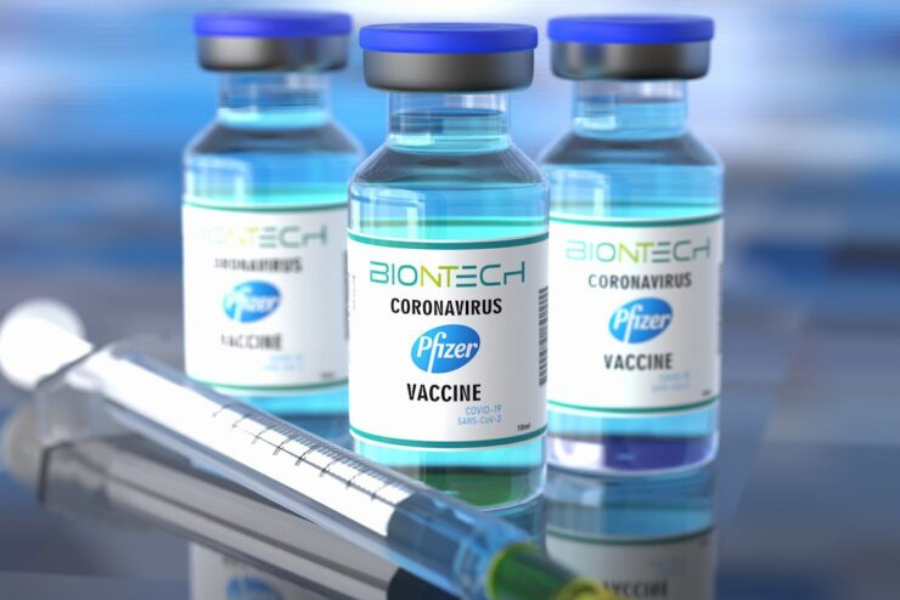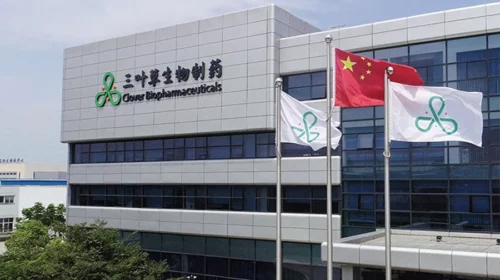Fosun Pharma Sells Down BioNTech Stake, Though Divorce Looks Unlikely

The Chinese company profited handsomely from its investment in the German vaccine maker, and is most likely selling the stake to help service its parent’s large debt
Key Takeaways:
- Fosun Pharma said it sold 1.09 million BioNTech shares for $179 million, generating big profits after the stock rose more than fivefold from the original purchase price
- Fosun Pharma said the sale won’t affect the two companies’ business alliance, which includes plans to bring BioNTech’s high-tech mRNA Covid vaccines to China
By Doug Young
Could a highly-hyped alliance between financial conglomerate Fosun and German high-tech vaccine maker BioNTech SE (BNTX.US) be the latest victim of the former’s recent debt woes?
That’s one possible takeaway from the latest disclosure by Shanghai Fosun Pharmaceutical (Group) Co. Ltd. (2196.HK; 600196.SH) that it has unloaded a big chunk of the shares it purchased in BioNTech in early 2020 when the two first announced their tie-up. We shouldn’t feel too sorry for Fosun in this case, as it profited handsomely from the investment.
This particular story has two main threads. The first involves the Covid-19 pandemic that propelled BioNTech to global fame for its technology used to make a new generation of highly effective vaccines based on mRNA technology. BioNTech has benefited greatly from its fame, with its shares now up more than fivefold from where they traded just before the pandemic.
The other thread to the story is Fosun-specific, and involves a building debt crisis for the company following a global buying binge over the last decade. Much of that debt is held by the company’s main investment arm, the Hong Kong-listed Fosun International (0656.HK), which is Fosun Pharma’s controlling shareholder.
Thus, this latest share sale appears to be a move by Fosun International to raise some cash to service its big debt load. Whether or not the sale also means the tie-up with BioNTech is unraveling is another matter. A statement accompanying last Friday’s announcement of the sale, which was only released in Chinese, seeks to downplay any appearance that the BioNTech tie-up is coming undone.
“The proceeds from this sale will be used to supplement the working capital of the group,” the statement said. “The sale will not affect the cooperation between the group and BioNTech at the business level.”
All that said, we’ll take a deeper dive into this latest development by reviewing details of the actual share sale, followed by the history of this tie-up. Lastly, we’ll look at what all of this means for Fosun and its own financial situation.
Investors weren’t particularly moved by the announcement, with Fosun Pharma’s Hong Kong-listed shares rising a scant 0.6% in Monday trade, trailing a 1.7% gain for the broader Hang Seng Index. Its Shanghai-listed shares performed better, rising 1.6%. The company’s Shanghai shares also trade at a significantly higher price-to-earnings (P/E) ratio of 25, versus just 5 for the Hong Kong stock, showing domestic Chinese investors are more confident over the company’s future than international ones.
Fosun Pharma acquired the BioNTech shares it is now selling in March 2020 as part of a broader tie-up with BioNTech announced at the start of the pandemic. That part of their tie-up saw Fosun Pharma say it would buy 1.58 million BioNTech shares for $50 million. Fosun Pharma purchased the shares for $31.63 apiece, compared with the stock’s latest close of $160.37.
For any math-challenged people out there, that means that Fosun Pharma’s original $50 million investment would now be worth about $253 million, representing a very nice return for the company. Though we should also point out the investment was worth even more at one point when BioNTech’s stock soared as high as $350 late last year. So goes the market.
Stake sell-down
The latest announcement says Fosun Pharma sold some but not all of its BioNTech stake, disposing of 1.09 million shares for $179 million. After the sale it continues to hold 486,000 BioNTech shares, equal to about 0.2% of the German company’s total.
For any bean-counters out there, Fosun Pharma said it previously recorded 1.65 billion yuan ($233 million) in fair-value gains in 2020 and 2021 on the shares it just sold, and that those shares will have a negative impact of 690 million yuan on its profits this year. But the bottom line is that Fosun Pharma profited quite nicely from this investment, and will now almost certainly hand over some of those profits to Fosun International to help service its debt.
Last month Fosun said it would sell up to $11 billion in non-core assets to pay down its debt, so this gain is really just a small part of that much bigger effort.
Next we’ll look at the Fosun-BioNTech relationship, which was announced by the pair with much fanfare at the start of the pandemic in March 2020. It included Fosun Pharma’s $50 million equity investment that we mentioned earlier. Fosun Pharma also agreed to pay $135 million up-front and provide future milestone payments for the rights to sell BioNTech’s Covid vaccine in China.
In December 2020, the alliance took another step forward with Fosun Pharma’s announcement that it would buy at least 100 million doses of the BioNTech Covid vaccine for 250 million euros ($258 million) when it was approved for the China market. Half of that amount was supposed to be paid up-front by the end of 2020, meaning we can probably assume Fosun forked over 125 million euros at the time.
Last but not least, in May last year the pair announced plans to form a $200 million joint venture to manufacture BioNTech’s Covid vaccines in China. Fosun Pharma said it would provide half of the amount in the form of cash and production facilities.
So, if we do a little math, Fosun Pharma has pumped around $415 million into the tie-up to date through its various commitments. China has yet to approve BioNTech’s vaccine, despite Fosun Pharma’s earlier forecast that it expected to receive such approval around July 2021. That doesn’t mean Fosun should necessarily write off the joint venture, since it’s quite possible China will finally approve the vaccine or an updated version as it contemplates mass vaccinations as part of its plans to reopen to the outside world.
At the end of the day, we would probably tend to believe Fosun Pharma’s statement that its share sale was mostly a cash-raising exercise and won’t impact its BioNTech alliance. After all, the tie-up still has plenty of profit potential for both sides, even if it has been delayed by China’s slowness to approve any foreign vaccines. We would guess that such approval does seem likely to arrive at some point, probably in the next half year.
To subscribe to Bamboo Works weekly free newsletter, click here






